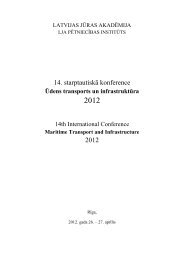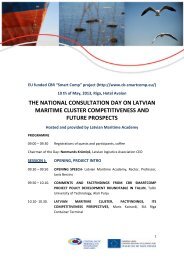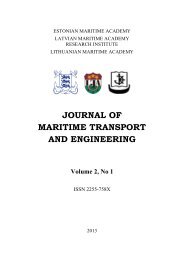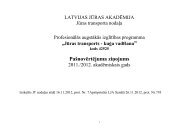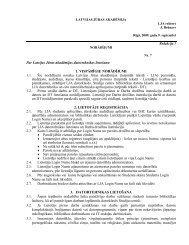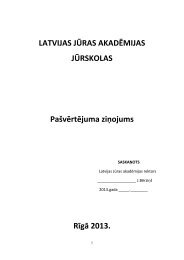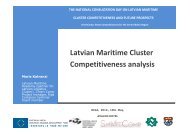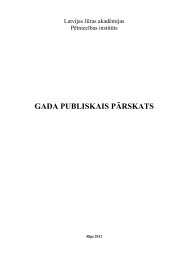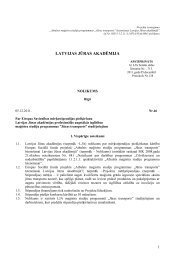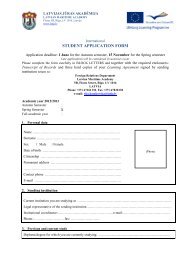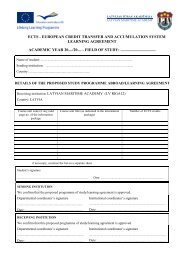Latvian Maritime academy
Latvian Maritime academy
Latvian Maritime academy
You also want an ePaper? Increase the reach of your titles
YUMPU automatically turns print PDFs into web optimized ePapers that Google loves.
1. Characterization of the European maritime self-concept from the historical – ideological point of<br />
view.<br />
2. Revelation of psycho-educational factors of the maritime self-concept development.<br />
The research object is a development of the maritime self-concept. The object has been researched at<br />
scientific levels of ideological and psycho-educational prerequisites.<br />
The research methodology<br />
Methodology of the research consists of the STCW 2 convention, paradigm of universal upbringing,<br />
idealism, humanism, existentialism, existential phenomenology and neotomism.<br />
Methodological attitudes are as follows:<br />
– STCW convention is important for assessing of the vocational maritime self-concept of maritime<br />
students and internalization of their maritime self-concept especially from the point of view of<br />
the social responsibility requirement.<br />
– The paradigm of universal upbringing indicates to development of the full power of personality.<br />
The context of biological, psychological and spiritual needs determines development of the<br />
maritime self-concept of an entire personality.<br />
– Idealism accentuates the spiritual nature of the man. Enrichment of the personality is based on<br />
the transcendental ideal at axiological level of the maritime self-concept. The final meaning of<br />
the human life promotes a sense of the individual freedom.<br />
– Humanism indicates the spirituality that is an inherent basis for education of the personal<br />
spiritual culture. The internalization of the maritime self-concept allows better understanding of<br />
existential human dignity from the humanistic point of view of personality freedom.<br />
– Existentialism refers to the human fear in the land and at sea. Existential psychology is a cause<br />
for the hope. This psychology denied an attachment to life pleasures and promotes personality<br />
liberation and purification of his / her existence. Development of the maritime self-concept<br />
expands a horizon and helps people overcome the tragedy of the existence, improve the<br />
emotional state and find the unique comfort.<br />
– Existential phenomenology indicates to self-education of valuable attitudes through the<br />
existential experience, artistic creativity, imagination, insight and reflection of values. The<br />
education through the experience is very important in relation to the marine phenomenon.<br />
– Neotomism refers to personalism and raises the personality above the daily. Formation of the<br />
maritime self-concept is based on the transcendental ideal of the European culture tradition. This<br />
ideal led to feel the value and dignity of the personality.<br />
Methodological type the research is theoretically descriptive, empirical diagnostic, qualitative<br />
phenomenological, semi-deep.<br />
Methods of the research<br />
There were used such research methods:<br />
– Retrospective, comparative, extrapolative, heuristic analysis and meta-analysis of scientific<br />
literature;<br />
– Convenient selection of respondents (the third-year students of the marine navigation),<br />
instructional interview, written survey (questionnaire procedure with open questions, selfreflection<br />
and free association), phenomenological content-analysis of internalization of the<br />
students’ maritime self-concept, interpretation, reduction, classification and systemization;<br />
– Hypothetical prognostic modeling of training of seafarers at the level of development of their<br />
maritime self-concept from the point of view of the personality value, and synthesis.<br />
Steps of the phenomenological content-analysis after some modifications:<br />
– Selection of manifest categories;<br />
– Categories are divided into subcategories;<br />
– Setting of the repetition frequency of (sub)categories;<br />
– Interpretation of results [24].<br />
The research basis is the Lithuanian maritime <strong>academy</strong>. The research was made in a homogeneous<br />
group in accordance with the science ethics.<br />
50 potential respondents were invited to answer the questionnaire:<br />
2 STCW (Standards of Training, Certification and Watchkeeping for Seafarers)<br />
23



